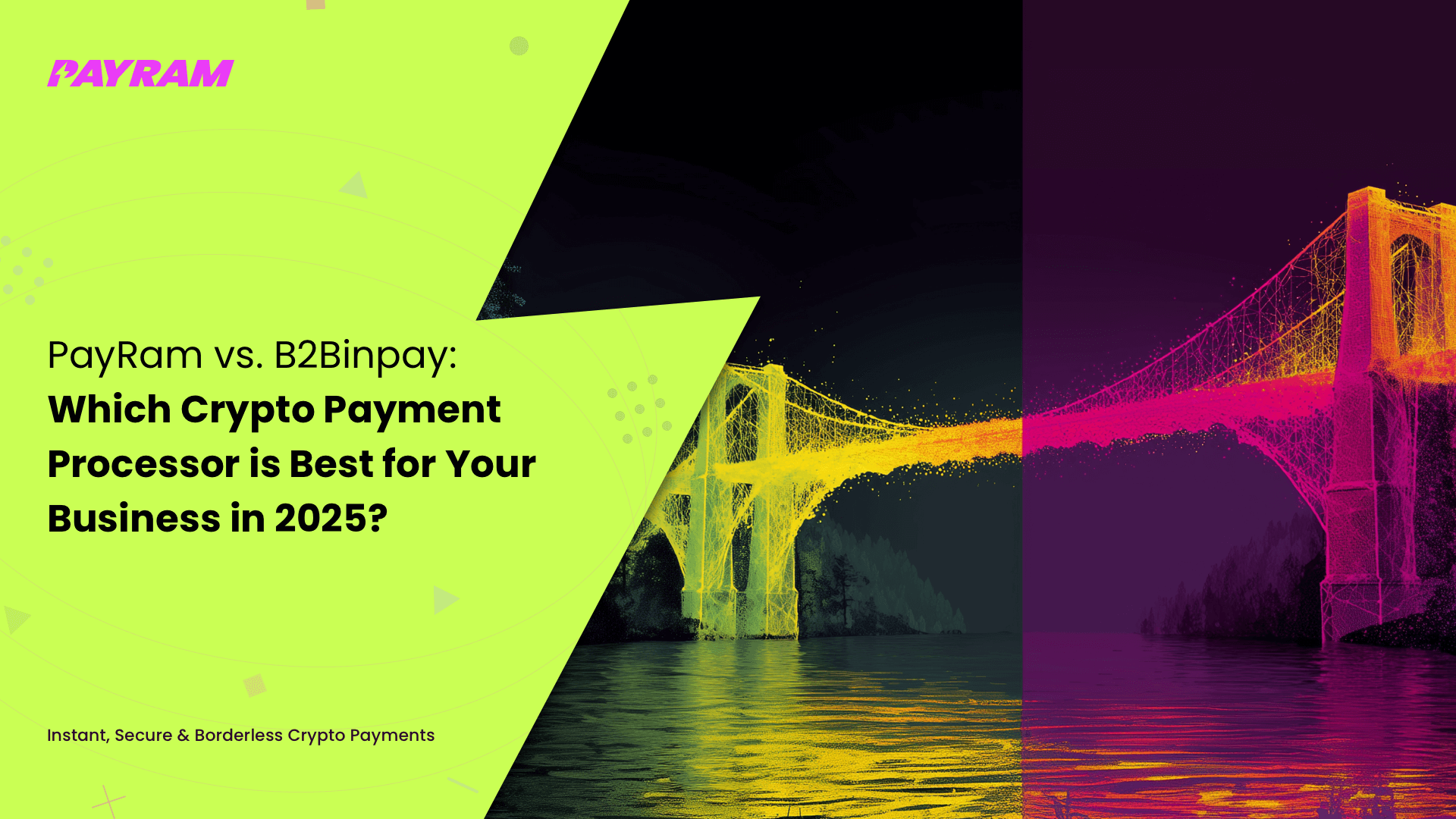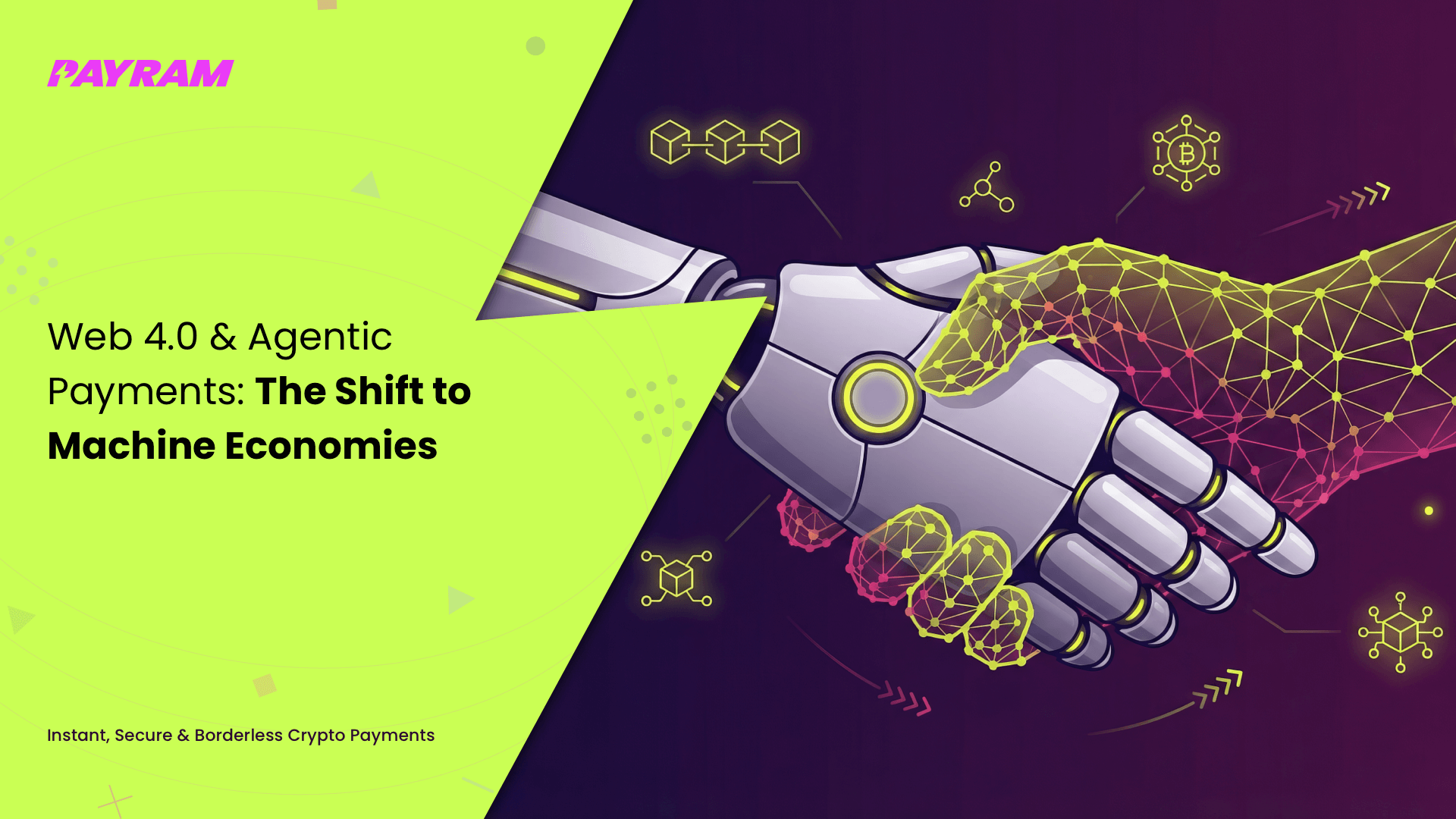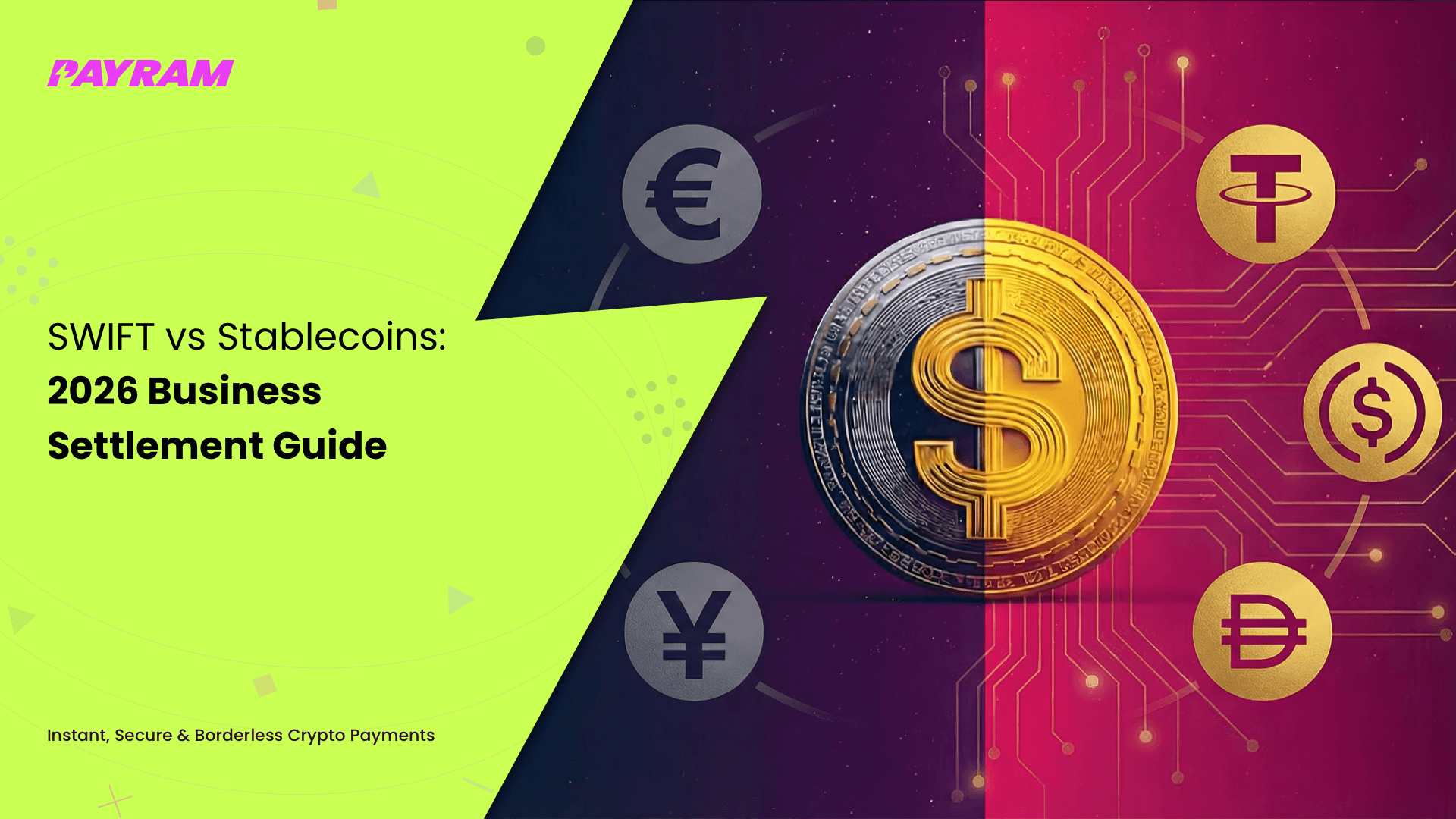PayRam vs. B2Binpay: Which Crypto Payment Processor is Best for Your Business in 2025?
Choosing a crypto payment processor is one of the most critical decisions your business will make. It’s not just about technology. It’s a gut check on your entire business philosophy. With titans like PayRam and B2Binpay in the ring, it’s easy to get lost in a sea of features. But this guide cuts through the noise to focus on the one question that truly matters: How much control do you really want over your own money?
Table of Contents
- At a Glance: The 30-Second Showdown
- The Great Divide: Custodial vs. Self-Hosted Explained
- The Deep Dive: A Head-to-Head Battle
- Fees & Pricing
- Security & Trust
- Coins & Cash-Outs
- Integration & Usability
- Customer Support
- The Final Verdict: Which Processor is Right for You?
- Frequently Asked Questions (FAQ)
The Short Answer: Which One Should You Choose?
- Choose PayRam if: You are a tech-forward business, especially in a high-risk industry like iGaming or adult entertainment, that demands absolute financial sovereignty, iron-clad censorship resistance, and wants to obliterate per-transaction processing fees.
- Choose B2Binpay if: You are a large, regulated enterprise that needs a hands-off, managed solution with deep compliance features and prefers to let a third party handle the heavy lifting of wallet security.
The Bottom Line: Both are powerful payment processors, but they are built on fundamentally different worlds. The best choice hangs on your appetite for control, your tolerance for risk, and your vision for the future.
At a Glance: The 30-Second Showdown
No time to waste? This table lays out the core differences in black and white.
The Great Divide: A Cage Match of Control
The most important difference between PayRam and B2Binpay isn’t a feature. It’s a philosophy. It’s the raw, elemental choice between convenience and absolute control, and it will define your business's financial destiny.
B2Binpay's Custodial Model: The Gilded Cage
A custodial gateway like B2Binpay is like a high-security bank vault for your crypto. They hold your private keys for you. This means they take on the monumental task of securing your funds with institutional-grade armor like multi-signature wallets, 2FA, and constant security audits. For businesses that want to avoid the headache of crypto security, this is a godsend.
"Custodial wallets are ideal for users who prefer a managed approach, where a trusted provider handles security, backups, and recovery. This makes them a convenient option for institutions, enterprises, and new investors." - BitGo
However, this convenience comes with a strategic trade-off that brings the crypto maxim, ‘Not your keys, not your crypto,’ into sharp focus. You are placing your trust in a third party. If they get hacked, face regulatory seizure, or go insolvent, your funds are at risk. Access is a privilege, not a right, granted only after passing strict KYC/AML checks. For a regulated company, this is a feature. For an online casino or a global e-commerce store, it’s a potential single point of failure.
PayRam's Self-Hosted Model: The Sovereign Fortress
A non-custodial, self-hosted gateway like PayRam hands you the keys to the kingdom. The software runs on your own server, which means you and only you can ever access your funds. You are your own bank.
The power here is absolute financial sovereignty. Your funds can't be frozen, censored, or seized by a payment processor. This is not a feature, it's a lifeline for businesses in high-risk arenas that are routinely de-platformed. The trade-off? You are the sole guardian of your fortress. Lose your keys, and the treasure is lost forever. Historically, this was a high technical hurdle, but PayRam shattered that barrier with a slick, UI-driven setup that makes digital sovereignty accessible to everyone, not just DevOps wizards.
The Deep Dive: A Head-to-Head Battle
Now let's see how these two philosophies play out in the real world across the five rounds that truly matter.
Fees & Pricing Structure
B2Binpay uses a familiar, volume-tiered fee structure. They take a small percentage of every transaction, which shrinks as your volume grows. It’s predictable.
- Processing Fees: A sliding scale from 0.50% down to 0.25% for multi-million dollar volumes.
- Hidden Costs: A $1,000 onboarding fee for their Enterprise model and potential fees for bank withdrawals.
PayRam takes a different approach. They charge zero direct payment processing fees. That’s right, 0%. This can translate into an earth-shattering amount of savings. They make money on optional, advanced services.
- Processing Fees: 0%.
- Service Fees: Charges apply for value-added services like automated fund orchestration and sweeping. If you need to constantly consolidate funds from thousands of addresses, there's a service fee.
Verdict: This isn't even a fair fight for most businesses. If you have significant volume and don't need complex, constant fund sweeping, PayRam is the undisputed champion of cost-efficiency. B2Binpay only makes sense if your volume is low but your need for automated treasury services is incredibly high.
Security & Trust
B2Binpay offers managed security. They are the guards at the gate, providing a full suite of protections like multi-factor authentication, address whitelisting, and KYT (Know-Your-Transaction) risk scoring through partners like Chainalysis. It’s security-as-a-service, designed for peace of mind.
PayRam puts security in your hands. The platform is built on a foundation of security best practices, but you are the one holding the shield. This model gives you unparalleled protection from third-party meddling but demands a proactive stance on your end. It’s the core of the unbannable gateway philosophy.
"With non-custodial wallets, you as the wallet owner are solely responsible for properly storing and protecting your private key. There is no hotline to call if you lose access." - Kraken Learn
Verdict: This comes down to who you trust more: a third-party corporation or yourself. For maximum protection against censorship and account freezes, PayRam's self-custody model is the only true fortress. For those who prefer the convenience of a managed security blanket, B2Binpay offers a robust service.
Supported Assets & Settlement Options
B2Binpay boasts a massive arsenal, supporting nearly 100 different tokens and over 80 coins. They offer flexible settlement, letting you cash out to fiat (like USD or EUR) or hold major cryptos and stablecoins.
PayRam focuses on the assets that power global commerce: Bitcoin (BTC), Ethereum (ETH), and high-speed stablecoins on networks like Tron (TRX) and Solana (SOL). Funds hit your wallet instantly, giving you immediate control to hold, swap, or use their integrated On-Ramp and Off-Ramp services.
Verdict: B2Binpay wins on sheer quantity, making it a good choice for platforms targeting niche crypto communities. However, PayRam wins on speed and control, with direct-to-wallet settlement that puts you in the driver's seat.
Integration & Ease of Use
B2Binpay is a developer-first platform. It offers a powerful, complex API designed for deep enterprise integrations and requires a formal KYC process to get started. It’s built for large teams with long timelines.
PayRam is built for agility. Its standout feature is a stunningly simple graphical user interface for installation and configuration. This cracks open the world of self-hosting for businesses without a legion of developers. While a full API is available in the Documentation, its out-of-the-box power is its secret weapon.
Verdict: For custom builds, PayRam's blend of a powerful API and a simple UI offers unmatched flexibility and speed-to-market. B2Binpay is better suited for enterprises that require a more traditional, structured integration journey.
Customer & Technical Support
B2Binpay provides a structured, 24/7 technical support system. It’s the kind of enterprise-level hand-holding you’d expect from a managed service, crucial for companies that need a reliable safety net.
PayRam, as a self-hosted solution, focuses its support on the platform's functionality and integration. The responsibility for your server and infrastructure is yours, which is the very essence of the self-sovereignty model.
Verdict: If you need a 24/7 helpline for a fully managed service, B2Binpay delivers. If you're a self-sufficient team that values control over hand-holding, PayRam is built for you.
The Final Verdict: Who Wins the Crown in 2025?
The best choice isn't about a scorecard. It's about your DNA. This table makes the choice crystal clear.
The Undisputed Winner for 2025
While B2Binpay offers a safe harbor, PayRam is the battleship. For serious businesses building for long-term growth, resilience, and profitability, PayRam's self-hosted architecture is the only choice that provides a truly powerful and sustainable foundation.
Conclusion: Your Business, Your Choice
The right choice isn't about a simple feature checklist. It's about aligning your payment infrastructure with your core business philosophy on control, risk, and responsibility. B2Binpay offers a guarded path for those willing to trade freedom for convenience.
PayRam champions financial sovereignty, delivering the tools for businesses ready to become their own bank. Armed with this direct comparison, you can now make a confident decision that supports your long-term growth.
Frequently Asked Questions (FAQ)
1. Is PayRam or B2Binpay better for an online casino?
For an online casino, PayRam is unequivocally the better choice. Its non-custodial, censorship-resistant architecture means your funds can't be frozen by a third-party processor, a critical risk in the iGaming industry. The 0% processing fee model also dramatically increases margins on high-volume transactions.
2. What does "custodial" really mean for my funds?
Custodial means a third party (like B2Binpay) holds the private keys to your crypto wallet. As detailed by financial authorities like the DFPI, this introduces counterparty risk. If that company has a security breach or faces legal issues, your access to your funds could be compromised. With a non-custodial solution like PayRam, you are the only one who ever holds the keys.
3. Can I still get my money out in dollars or euros with PayRam?
Yes. PayRam offers integrated On-Ramp and Off-Ramp services, allowing you to easily convert your cryptocurrency into fiat currency and transfer it to your bank account, all while maintaining self-custody of your assets until the moment of conversion.
4. Is setting up a self-hosted gateway like PayRam difficult?
Historically, it could be. However, PayRam was specifically designed to solve this problem. It features a user-friendly, graphical interface for installation and configuration, eliminating the need for complex command-line work for the core setup. You can find detailed guides in the Documentation.
5. How does B2Binpay's fee structure compare to PayRam's at high volumes?
The difference is stark. A merchant processing $5 million a month would pay B2Binpay between $15,000 and $20,000 in fees. With PayRam, the processing fee would be $0. The only costs would be for optional advanced services like automated fund sweeping, making PayRam vastly more economical at scale.
6. Which platform is better for accepting stablecoins like USDT?
Both platforms support Tether (USDT). However, PayRam is optimized for high-speed, low-cost stablecoin transactions on networks like TRON (TRC-20) and Solana, which are crucial for industries like iGaming and cross-border e-commerce. The global stablecoin market is a $72 billion tsunami, and having an efficient gateway is key.
7. What are the compliance implications of each platform?
B2Binpay has a mandatory, built-in compliance framework, including KYC/AML verification for all users. PayRam provides you with the tools to be compliant but puts you in control. This allows for more flexibility, especially for businesses operating in regions with evolving regulations, a topic explored in our guide to MiCA regulations.
8. Can I use PayRam for a charity or non-profit?
Absolutely. PayRam is an excellent choice for a charity. The 0% processing fee means that more of every donation goes directly to the cause, rather than being lost to payment processors.
9. How does the risk of chargebacks differ?
Both platforms eliminate traditional credit card chargeback fraud because blockchain transactions are irreversible. This is a massive advantage of accepting crypto payments and a key way to eliminate fraudulent chargebacks permanently.
10. Where can I learn more about other crypto payment gateway comparisons?
The blog features several in-depth comparisons. You can see how PayRam stacks up against other major players in our popular articles: Payram vs BTCPay Server and Payram vs Coinbase Commerce.
Ready to Declare Your Financial Independence?
Stop paying punishing fees and handing over control of your hard-earned revenue. It's time to build your business on a foundation of strength, sovereignty, and profitability.


.svg)







%20Wero%20vs%20Visa%20%26%20Mastercard%20PayRam.png)


.svg)